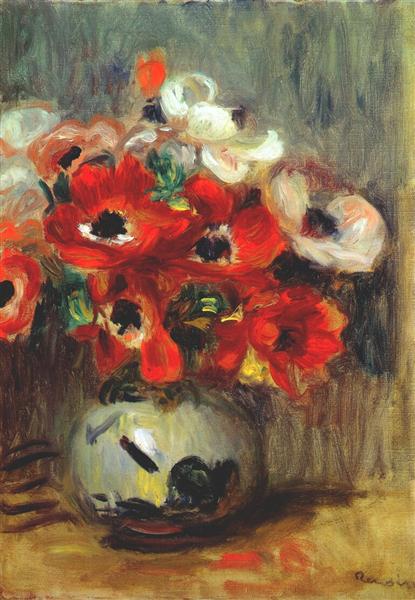Description
Pierre-Auguste Renoir's 1905 painting "Anemones" stands as a magnificent testament to the Impressionist master's virtuosity in depicting nature, and in particular the ephemeral beauty of flowers. In this painting, Renoir makes use of his signature style, combining loose brushwork and a vibrant palette to capture not only form but also the light and color radiating from the elements of nature.
The composition focuses on a lush bouquet of anemones, displaying a captivating mix of hues. Renoir employs varying shades of red, fuchsia and white, creating a contrast that gives the flowers an almost three-dimensional quality. The anemones seem to burst from the canvas, their petals intertwining in a dynamic dance that captures the viewer’s attention and invites them to come closer. The arrangement of the flowers throughout the painting reflects a natural arrangement, moving away from the compositional rigidity that characterizes other styles. The fluidity of the composition is enhanced by the infusion of light that seems to illuminate each petal, the result of a careful choice of color and technique.
The background of the painting, in soft and somewhat more diffuse tones, complements the flowers without detracting from their prominence. This use of the background is in line with the impressionist practice of capturing the atmosphere of the moment, rather than fixing a detailed representation of reality. The effect is one of delicate harmony that focuses attention on the central theme, enriched by the shadows and nuances that Renoir uses to give a sense of depth and volume.
Renoir, one of the founders of the Impressionist movement, is known for his ability to convey the warmth and sensuality of forms. Throughout his career, he explored diverse subjects, from scenes of everyday life and portraits to vibrant landscapes. Anemones is situated in a mature stage of his artistic career, characterized by a freer approach and greater expression of color. This work, like others in his floral collection, resonates with the continued exploration of color as a means of emotional expression.
This painting is also significant in the broader context of Impressionism. Renoir, often accompanied by his contemporary Claude Monet, constantly dialogued with nature and visual perception. Flowers do not only represent a decorative motif, but also symbolise a connection with the natural beauty of the world, a recurring theme seen in many Impressionist works.
"Anemones" is a reminder of the impact simplicity can have on art, showing how something as ordinary as a bouquet of flowers can be elevated to art through the unique interpretation of a master.
Thus, this work invites contemplation and appreciation of color and light, elements that in Renoir's hands are transformed into a language of their own that communicates the transience of beauty. Through "Anemones," the viewer is drawn into a world where nature is palpably alive, manifesting the essence of Impressionism at its finest.
KUADROS ©, a famous painting on your wall.
Hand-made oil painting reproductions, with the quality of professional artists and the distinctive seal of KUADROS ©.
Painting reproduction service with satisfaction guarantee. If you are not completely satisfied with the replica of your painting, we will refund 100% of your money.

